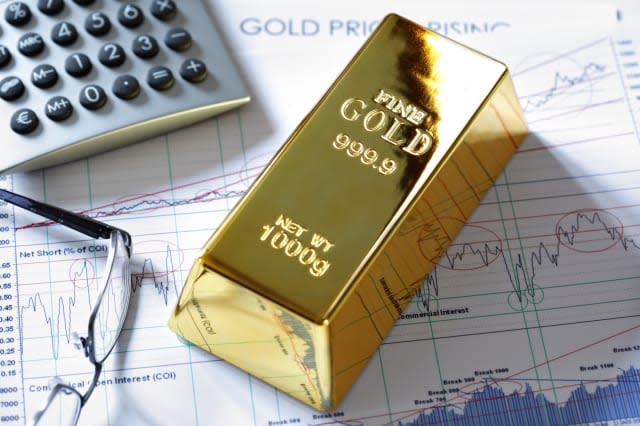The best and worst investments of 2016 - should you invest?

The best performing investment funds of 2016 have been revealed - two of which would have doubled your money in a year. So should you plough your cash in now?
See also: What should growth investors buy for 2017?
See also: My top 3 FTSE 100 stocks for 2017
See also: Is this the best sector to invest in for 2017?
The best performing fund of 2016 (up to 14 December) was the WAY Charteris Gold & Precious Metals fund, which returned over 123%. This was followed by the Junior Gold fund, which returned over 199%. It makes them a tempting proposition for any investor. However, it's important to understand why these funds have done so well.
Both funds have profited enormously from the rise in the gold price - which tends to rise at times of political and economic uncertainty, and a 15% fall of the pound against the dollar. In fact, most of the top ten owes a great deal to the gold price.
Rising commodities prices have also fed into the performance of stock markets which depend to a large extent on resources - including Brazil and Russia.
Top 10 funds
WAY Charteris Gold & Precious Metals 123.5%
Junior Gold 119.6%
HSBC GIF Russia Equity 85.6%
SF Webb Capital Smaller Companies Gold 85.1%
Smith & Williamson Global Gold & Resources 82.1%
JPM Natural Resources 80.6%
CF Canlife Global Resource 74.4%
Investec Global Gold 72.8%
HSBC GIF Brazil Equity 72.7%
CF Ruffer Gold 71.1%
Should you invest?
Hargreaves Lansdown, which put together the list of winners and losers for the year, warns that the fact that gold funds, Russia funds and Brazil funds have done well doesn't necessarily mean it's a good idea to jump in.
As a general rule, once a fund has doubled in value in the space of a year, you're not taking advantage of the beginnings of a trend, you are jumping on a bandwagon, which may well have seen the best of its run already.
There's every chance that commodity prices will continue to do well, and there's every chance that gold will continue to prosper from political upheaval around the world. However, there's really no way to be sure. As Laith Khalaf, a Senior Analyst for Hargreaves Lansdown puts it: "If 2016 taught us one thing though, it's that investment portfolios shouldn't be shaped by the political calendar- not only are public votes unpredictable, so are their effects on financial markets."
He added: "Picking investments based on unfolding political events is therefore akin to relinquishing decisions to not one, but two coin flips. Those who took their money out of the stock market because of the EU referendum have missed out on substantial returns, despite the fact they may have correctly guessed we were headed for Brexit."
What should you do?
Instead of trying to guess the markets, he says, we should focus on the things we can control: saving as much as we can each month, investing in tried and tested fund managers, and making your portfolio as tax efficient as possible by using SIPPs and ISAs.
There are, however, some things we can learn from the worst performing funds of the year. The three worst performers are 'absolute return funds', these invest in a mixture of assets that are designed to try not to lose money. As Khalaf points out: "While all three funds at the bottom of the table have better long term performance, the numbers show the journey to absolute returns can be anything but a smooth ride. While all absolute return funds target a positive return over at most three years, they go about their business in very different ways and with varying levels of risk, so it's particularly important not to judge a book by its cover when picking funds from this sector."
Another feature of the bottom of the table is property funds, which had a torrid summer. Khalaf points out: "The summer saw billions of pounds of investors' money frozen, as funds suspended trading while they sold properties to meet demand for withdrawals. While some order has now returned to this sector, the underlying risk of another big freeze remains, if we see another run on commercial property funds. Meanwhile managers are holding high levels of cash to try to avoid running into problems, which will act as a drag on investor returns."
Bottom 10
FP Argonaut Absolute Return -26.2%
CF Odey Absolute Return -18%
City Financial Absolute Equity -14.6%
Old Mutual UK Opportunities -12.2%
Invesco Korean Equity -11.4%
Franklin Diversified Growth -10.7%
Jupiter UK Growth -9.1%
AXA Framlington Biotech -9.1%
M&G Property Portfolio Sterling -8%
FP Charteris Property -7.7%
However, just as the winners of 2016 aren't a sure thing for 2017, the losers aren't all a nightmare proposition either. Khalaf says: "Even good managers have bad years and that's certainly the case for Steve Davies of Jupiter UK Growth. His top ten holdings reads like a roll call of Brexit losers, including Lloyds, Dixons Carphone, and IAG. However, 12 months is a short time in fund management, and despite a rocky 2016, over five years the fund is still more than 20% ahead of the UK stock market."
He points out that more uncertainty will continue in 2017, with elections in France, Germany and The Netherlands, "which will no doubt cause wrinkles in markets given the potential for these votes to prompt referenda on EU membership. However this year has demonstrated the folly of predicting the outcome of political votes, not to mention the effect they may have on financial markets. The UK funds industry saw record levels of investor withdrawals around the referendum, yet the FTSE 100 has risen 10% since the UK went to the polls."




